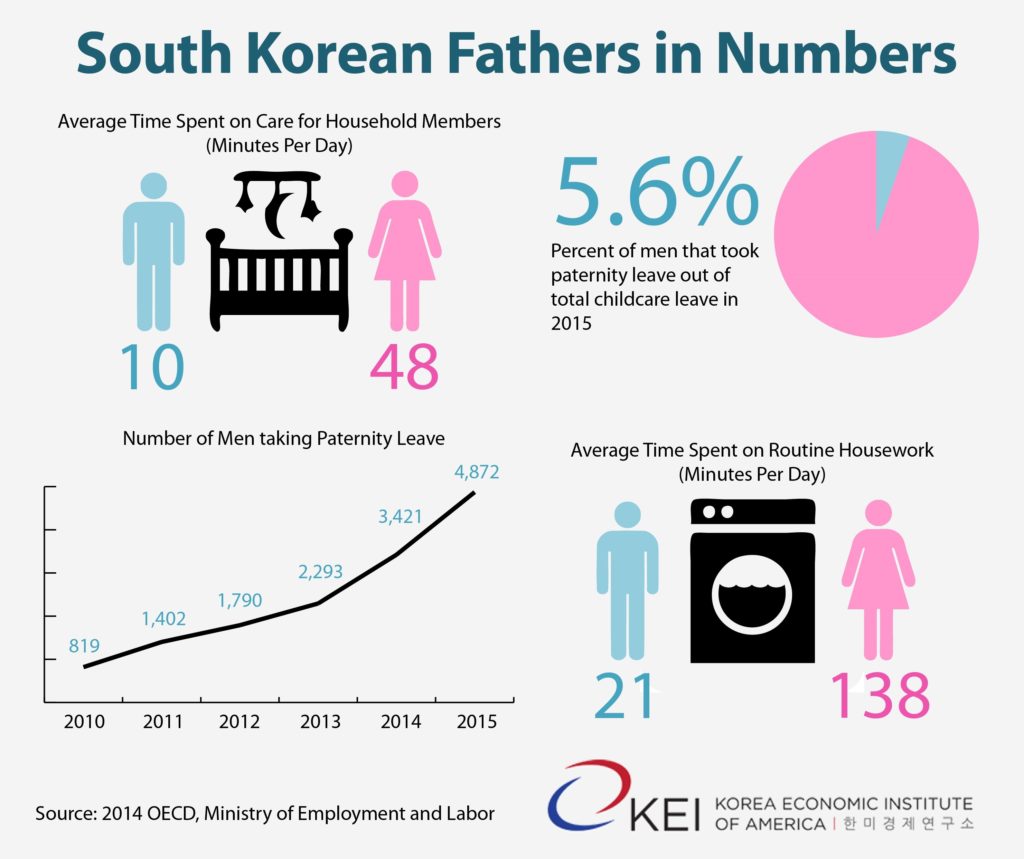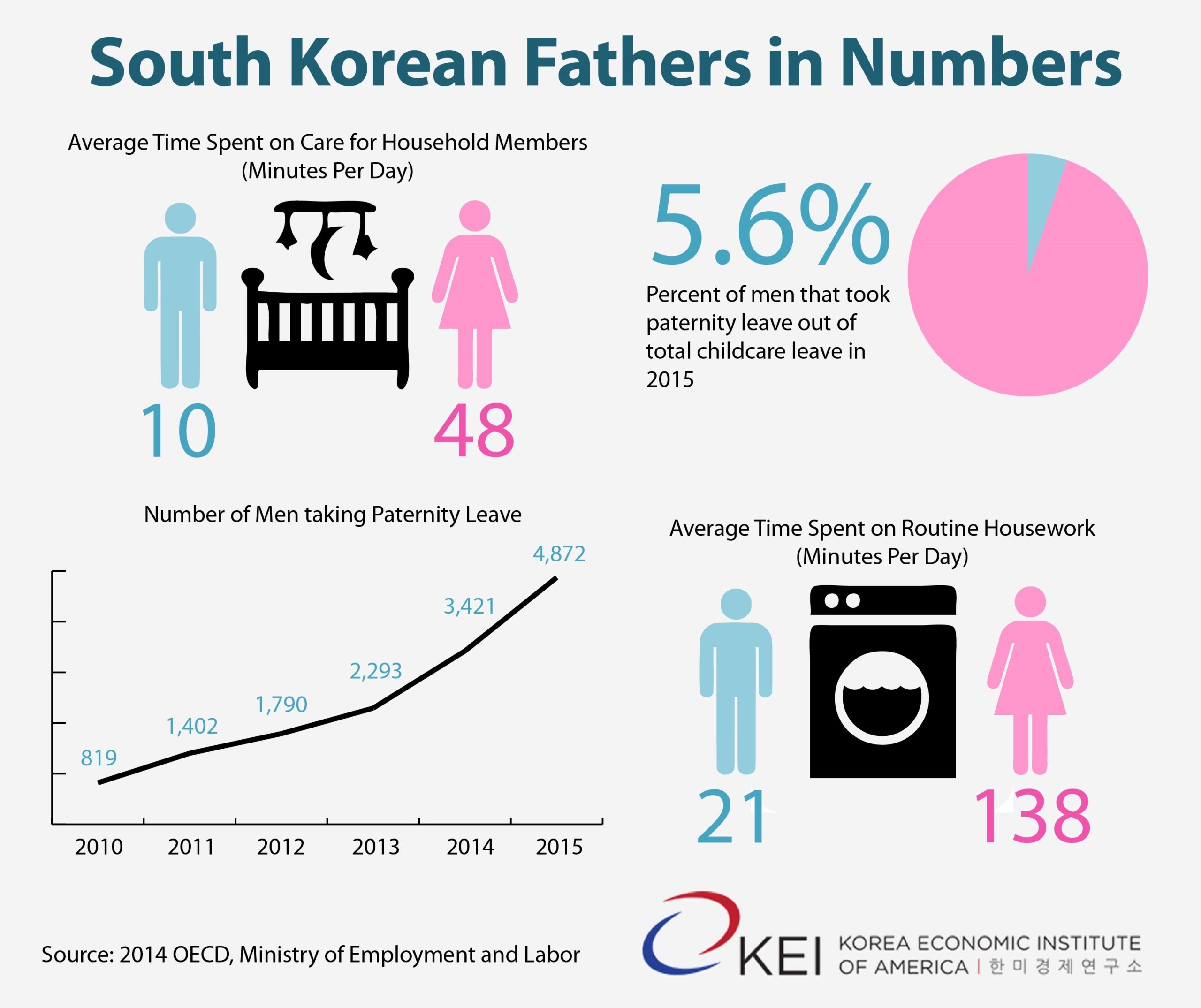The Peninsula
South Korea’s Dad Dilemma: More Fathers Take Paternity Leave but Large Gap Remains

By Jenna Gibson
The South Korean government has been pretty creative in its search for a solution to their rock bottom birth rate – from subsidies for fertility treatment to encouraging employees to go home without saying goodbye to their boss. But one of the country’s giant conglomerates is taking a more drastic step by mandating that their male employees take a month off after having a child.
Lotte Group, which employs 180,000 people in Korea, announced at its recent “Way of Women” forum that they will start mandating paternity leave next year. They will also pay for the difference between the government’s subsidy of 1 million won ($853) and the employee’s full salary for a month of leave. They will also extend maternity leave from one year to two, and guarantee full pay for at least a month.
With this policy, Lotte is ahead of the curve – while South Korea guarantees a year of paternity leave for those that wish to take it, very few men choose to do so. Changing corporate culture and expectations could be key – in interviews conducted by Munhwa Daily this fall, men cited perception as one of the main reasons they chose not to take advantage of parental leave. One said he would be labeled a “weirdo” at work for being the only one in his office to take paternity leave. Another said he feared he would have a harder time moving up in his career and providing for his family afterwards.
Uphill Battle
South Korean fathers are notorious for spending very little time on household chores, including childcare. According to a 2014 OECD study, South Korean men spend the least amount of time in the OECD on “unpaid work,” setting aside only 45 minutes a day for routine housework, shopping and childcare. In contrast, Korean women spend nearly four hours per day on these types of tasks.
Korea’s strict work culture certainly plays a role. When Korean workers are spending an average of 347 hours longer at work each year than their OECD peers, something’s got to give. And, more often than not, the burden falls to women. While more women are trying to reset the work-life balance, they still often feel pressure to put their careers on hold after starting a family, leading to a noticeable dip in women’s workforce participation among 20-40 year olds.
But work culture also affects men who would otherwise like to spend more time with their families. Despite Korea providing a generous 52 weeks of paternity leave for new dads, only 4,872 men took advantage of leave in 2015, just 5.6 percent of the 87,339 people who took childcare leave last year.
The imbalance in which parent provides childcare has caused more than marital strife – experts have pointed to the issue as one of the root causes for Korea’s chronically low birth rate. Without the guarantee of a reliable parenting partner, Korean women have continued to delay marriage and childbirth. South Korean has made father-targeted programs a priority, aiming to increase the number of fathers taking paternity leave and spending time with their children.
Signs of Progress
While the wide gap remains, men are participating more in child-rearing than ever before. While the number of men taking paternity leave in 2015 is still minuscule, it does represent a steady increase. In fact, five times more Korean men took paternity leave in 2015 than in 2010.
Part of this could be due to the explosive popularity of television shows that revolve around fathers. One, called “Dad! Where are We Going?” followed a group of celebrity dads taking their kids on camping trips around Korea. The show got great reviews, and has been remade in China, Vietnam and Japan.
Another, “Return of Superman” shows the daily life of celebrity dads when they’re left alone with their kids. The key here is the growth of these fathers over time – when they first appear on the show, many of them have no clue how to cook basic meals or change their babies’ diapers. Viewers can relate to these struggles, and also learn some parenting techniques along with the dads on screen.
The families that appear on these shows have become household names – the Song triplets, three adorable toddlers who appeared on “Return of Superman” for two years with their actor father, were rated the fifth most popular celebrities in Korea in 2015. The kids raked in $4.26 million from appearing in 11 different ad campaigns in 2015.
But these super dads may be influencing more than just viewer’s shopping habits – they may be pushing more Korean fathers to up their parenting prowess.
While it may seem like a stretch to say that a TV show could influence viewers’ behavior so drastically, there have been plenty of cases around the world that show otherwise. In India, for example, a hyper-popular soap opera led to an increased interest in marrying for love. And a South African show increased awareness in HIV/AIDs prevention among its viewers.
Even in Korea it’s easy to see the impact of celebrities – after actress Song Hye Kyo was seen applying a Laneige lipstick in the powerhouse drama Descendants of the Sun, the product began flying off shelves. And sales of the Hyundai Tucson SUV rose 10 percent in the month after it appeared on the show.
Of course, choosing which lipstick to buy is a long way from changing your parenting style, but there is some evidence that Korean parents are taking note of these celebrity dads. In a recent survey of Korean women with children under the age of 3, for example, the moms indicated that “Return of Superman” did have some impact on their husbands’ behavior.
When asked if their husbands are similar to those shown on TV, 40 percent of moms said “My husband is somewhat different from the ones presented on TV shows, but he tries really hard.” The second most common response, at 25.8 percent, was “My husband tries to spend spare time with the kids, and resembles the hero daddies on TV from time to time.” Still, 21.8 percent of the women agreed with the sentiment that while their husbands take some responsibility for child-rearing, the example shown by celebrity dads on TV are somewhat unrealistic for the average husband.
At the same time, when asked which “Return of Superman” star is their favorite, the most popular answer was actor Ki Tae-young, who was described as a father who diligently educates himself on parenting techniques. We may find that the only force powerful enough to overcome workplace stigma might be Korean entertainment.
Jenna Gibson is the Director of Communications at the Korea Economic Institute of America. The views expressed here are the author’s alone. KEI interns Sungeun (Grace) Chung and Min Tae Chung assisted with research and translation for this post.
Image from Photo and Share CC’s photostream on flickr Creative Commons.

